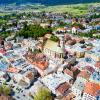
IIASA made contributions to the Computational Social Science Conference, held on October 28-29, 2024 at Universitat Politècnica de Catalunya in Barcelona. Co-organized by the Barcelona Supercomputing Center, CODATA, and “la Caixa” Foundation, the conference brought together over 160 participants, including top researchers, data specialists, and infrastructure experts, to explore cutting-edge methods, novel insights, data workflows, and data stewardship in computational social science.
The transformative era in social science, driven by vast data generation and new computational capabilities, offers groundbreaking opportunities for addressing complex global issues, such as sustainability. However, this transformation faces challenges, such as data sensitivity and limited access to curated data, as well as managing issues such as transparency, reproducibility, and accessibility. Conference discussions addressed key questions on these issues, exploring how computational social science can advance with novel data sources, such as digital platforms, more advanced computational capabilities, and more efficient data policies.
IIASA has contributed to shaping the conference and its proceedings by bringing in expertise and insights on advanced modeling approaches such as social simulations and agent-based modeling (ABM) emphasizing them as tools that can leverage data and computational capabilities to produce policy-relevant research.
Sebastian Poledna, Leader of the Exploratory Modeling Research Group within the Advancing Systems Analysis (ASA) Program, showcased IIASA’s latest research using diverse data sources to inform a behavioral socio-economic ABM model. The IIASA model, which represents a national economy as a network of individuals and companies, illustrates how their dynamic interactions and bounded rationality shape socio-economic outcomes. Poledna’s presentation demonstrated the model's capacity for economic forecasting, assessing impacts like inflation, natural disasters, and migration, and generating insights for data-informed policy.
“The contribution of ASA scientists to this Conference advances the Program’s commitment to develop systems analysis methods and data,” says Elena Rovenskaya, ASA Program Director & Principal Research Scholar at IIASA; member of CODATA’s Executive Committee*; and member of the organizing committee of the Conference. “It is also an example of how the partnership between two organizations combines CODATA’s expertise in data policy and infrastructure with IIASA’s strengths in systems analysis to drive impactful, open, and reliable scientific research that benefits the global research community and humanity as a whole.”
*CODATA is the Committee on Data of the International Science Council, which is dedicated to promote international collaboration to advance Open Science and to enhance data accessibility and usability for all areas of research. IIASA has been CODATA’s partner organization since 2020.
More information about the Conference can be found here.
More information on IIASA’s research advancing behavioral socio-economic agent-based modeling can be found here: ABM2Policy, W4.0, MacroMode, MYRIAD-EU, TransBuild, and BIOCLIMAPATHS.
References:
Poledna, S., Strelkovskii, N.  , Conte, A., Goujon, A.
, Conte, A., Goujon, A.  , Linnerooth-Bayer, J., Catalano, M., & Rovenskaya, E.
, Linnerooth-Bayer, J., Catalano, M., & Rovenskaya, E.  (2024). Economic and labour market impacts of migration in Austria: an agent-based modelling approach. Comparative Migration Studies 12 (1) e18. 10.1186/s40878-024-00374-3.
(2024). Economic and labour market impacts of migration in Austria: an agent-based modelling approach. Comparative Migration Studies 12 (1) e18. 10.1186/s40878-024-00374-3.
Bachner, G., Knittel, N., Poledna, S., Hochrainer-Stigler, S., & Reiter, K. (2023). Revealing indirect risks in complex socioeconomic systems: A highly detailed multi‐model analysis of flood events in Austria. Risk Analysis 44 229-243. 10.1111/risa.14144.
Hommes, C., He, M., Poledna, S., Siqueira, M., & Zhang, Y. (2022). CANVAS: A Canadian Behavioral Agent-Based Model. Bank of Canada Staff Working Paper 2022-51 10.34989/SWP-2022-51.
Poledna, S., Miess, M.G., Hommes, C., & Rabitsch, K. (2022). Economic forecasting with an agent-based model. European Economic Review 151 e104306. 10.1016/j.euroecorev.2022.104306.
Related news
Related events
News

11 March 2025
IIASA provides insights on research, technology, and innovation to Austrian federal states

06 March 2025
IIASA’s CAT Research Group joined the UN ECOSOC Partnership Forum 2025’s event: Global Challenges Action Innovation, Emerging Technologies & the Power of Partnerships

14 February 2025



